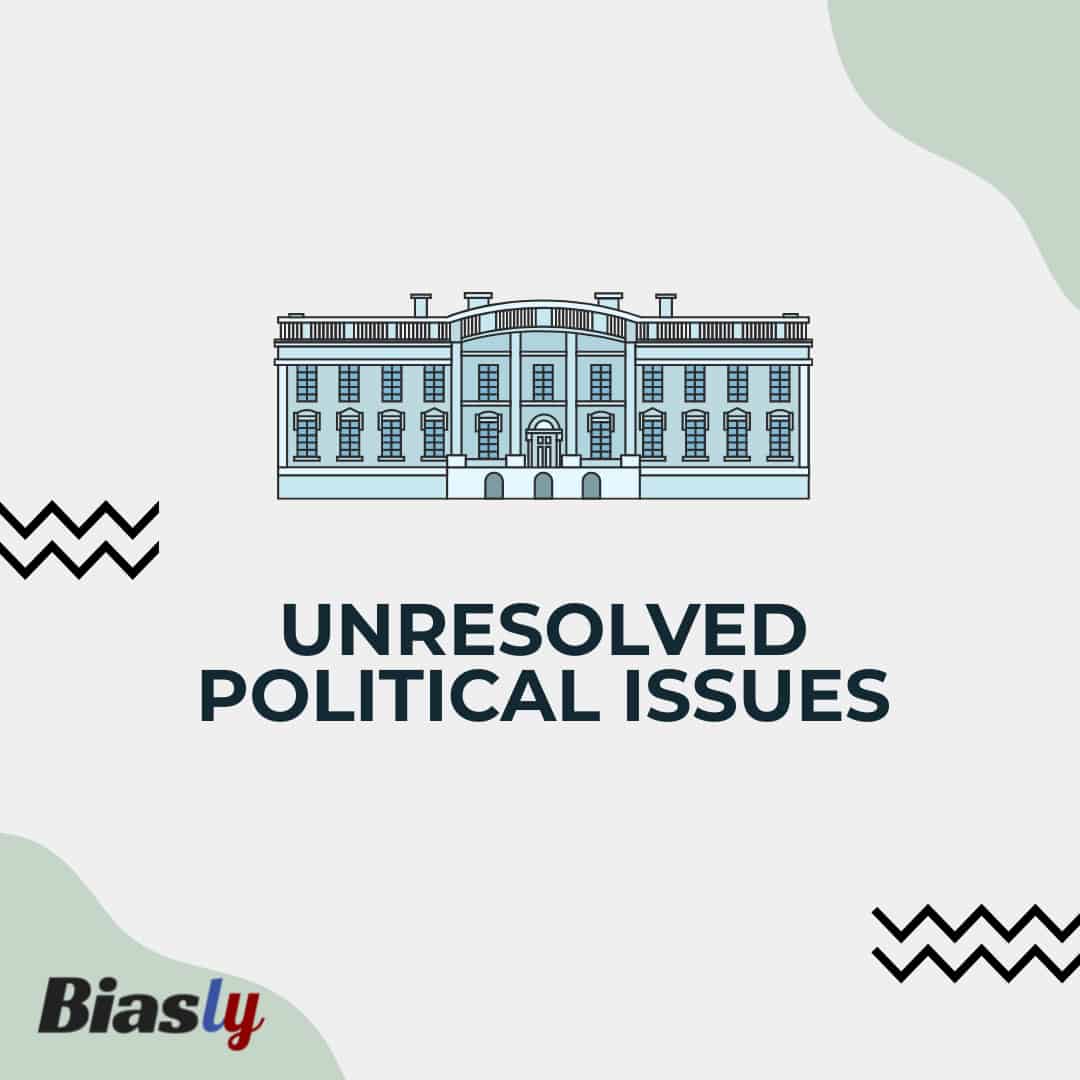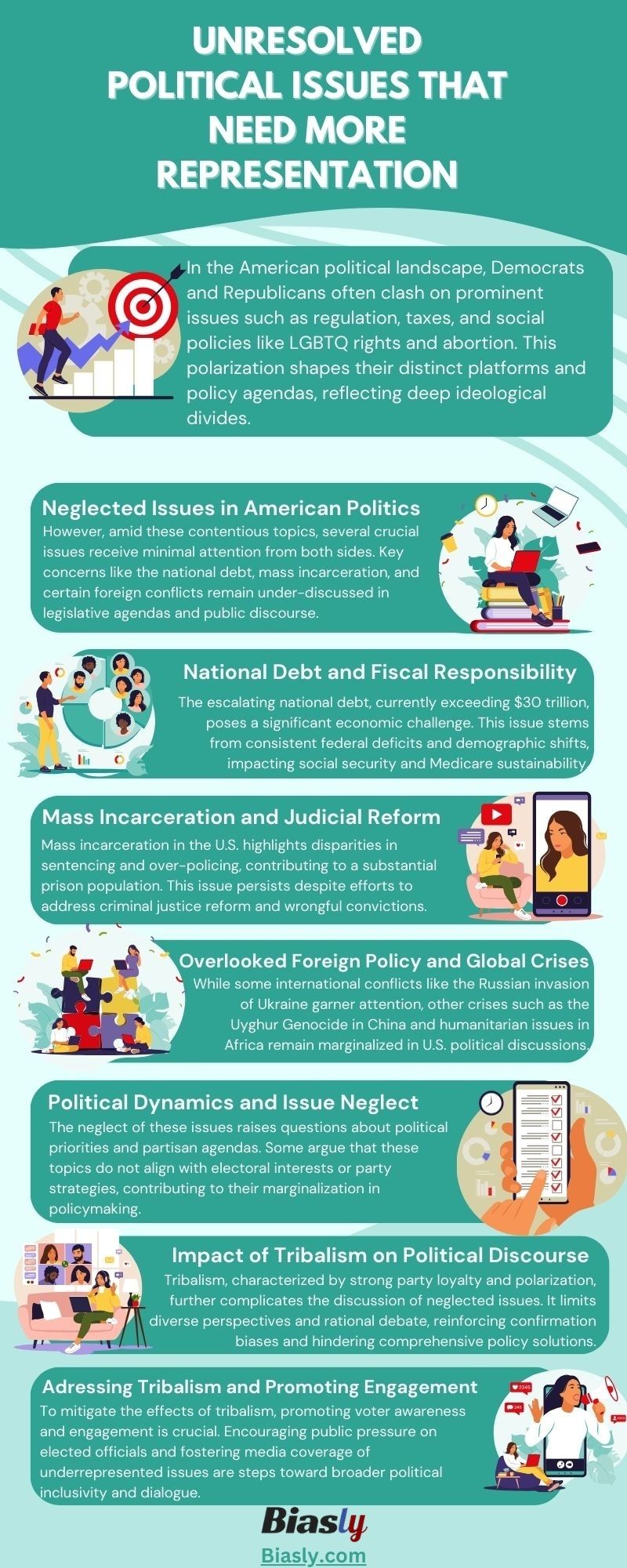
Anyone familiar with the bipartisan American political system knows that there are certain key topics that incite much disagreement between the Democrat and the Republican parties. While the left is predominantly focused on producing more regulation, spending, and higher taxes with stances on social issues ranging from pro-choice to pro-LGBTQ rights, common views held by the right-wing generally include less overall regulation, more fiscal conservatism, and lower taxes with stances on social issues ranging from pro-life to pro-gun rights. Among these and other issues, it seems as though Democrat vs Republican stances are becoming increasingly polarized on most major political or social issues.
However, despite this apparently distinct divide among bipartisan lines, there remain many important issues that neither the left nor the right seem especially concerned with. Some of these issues that have been under-discussed or under-represented in legislation on both sides include national debt and budget deficit, mass incarceration, certain foreign conflicts and strategic alliances, humanitarian crises, US immigration..
Unresolved Economic Issues including National Debt
One topic that has been conspicuously absent from the political discussion is the issue of national debt. U.S. national debt is the amount of public debt owed to other countries, investors, the Federal Reserve, as well as inter-governmental programs including social security, Medicare, and retirement plans. The national debt is incurred when the government spends more money than it earns. Today’s fiscal budget deficit (see chart below), totaling more than $30 Trillion is caused primarily by a continued federal deficit year over year, which means the higher spending of government funds by politicians and government officials in relation to insufficient government revenues. Other factors affecting the deficit include a lower birth rate than death rate which results in a lower working population, but a growing one, of elderly citizens relying on the government for aid. The fiscal monetary policy effects of the financial crisis of 2009 and Covid-19 are shown to provide substantial increases to this national debt level and resulting inflation issues. Inflation is the process in which the value of the American dollar decreases due to too much money being put out into the system while citizens face rising costs of living. If there is too many dollars in the system, prices will go up.
Embed this chart to discuss increases of spending vs revenues:
source: tradingeconomics.com
Unresolved Domestic Issues including Immigration
Even many domestic social problems continue to be undercovered and unresolved including the immigration policy debate, homeland security, national disasters such as the Flint Water Crisis, cyber hacking, and mass incarceration.
One phenomenon that continues to be largely ignored by key politicians is mass incarceration in the United States. Mass incarceration is the tendency of the prison system to harshly sentence or wrongfully convict many US citizens. This phenomenon occurs partially due to the over-policing of certain areas, which leads to a disproportionately large amount of the local population to be harshly punished for often minor or nonexistent crimes. Because of the drastic expansion of prison systems that has occurred since the 1970s, the US now holds a quarter of the world’s prisoners while only making up 5% of the total population. According to The Innocence Project, there were 850 exonerations in the U.S. since the 1980s. They also estimate that approximately 1% of the existing prison population (~20,000 prisoners) are innocent. So a better question might be how can we better reduce crime and how can we help the judicial systems and law enforcement convict the correct criminals. Two important issues that must both be addressed.
Unresolved Foreign Issues including Global Conflict
Another area often ignored by US politicians includes certain foreign conflicts and humanitarian crises. Though some foreign issues, such as the Russian invasion of Ukraine, receive much attention from politicians and media, others go completely unnoticed in US politics. Some of these issues that have been ignored in US politics include the ongoing Uyghur Genocide occurring in China, humanitarian crises in Cameroon and many other central African countries, and countless others. Though the question stands as to what extent can the US intervene in foreign conflicts or strive for isolationism, it would be nice for the American people to have more of a say in these discussions.
A further issue that remains largely ignored is the existence of strategic military alliances that the US has entered into in recent years. In some of these such alliances, the US government creates an agreement with another nation for some sort of personal gain, while the public remains mostly ignorant of the agreement’s economic, ethical, or national security-related implications. Though not a comprehensive list of all issues under-discussed in American politics, this provides some insight into the nature of issues that are ignored.
So Why Are These Issues Unresolved
The existence of such major and foundational issues in America that continue to be ignored by policymakers brings about the question of why these issues are ignored and whether this continued negligence is deliberate or not. One potential explanation for this gap could be that these issues don’t appeal to serve the interests of politicians or political parties, and would not aid them in being re-elected. Perhaps, certain issues don’t incite as much passion in supporters, which may, in turn, cause politicians to ignore such issues and focus on ideas that will win more people over. However, this can foster severe consequences when and if the public remains unaware of these issues and the causes and implications behind them.
Alternatively, neglecting to address a non-partisan or opposing stance on an issue could prevent splintering within a party by allowing groupthink bias to prevail, which again would have both positive and negative implications for elections and campaigning. Either way, it seems likely that certain issues are deliberately ignored in order to benefit or prevent the impairment of a party.
Tribalism: What is it & How does it work
Tribalism is defined as a person’s intense loyalty to some sort of social group that they are a part of, most notably to one’s political party in this instance. This loyalty may in turn lead to the oversimplification of certain issues and ideologies. The central worry about tribalism is that this then fosters extreme polarization, as political issues and debates become more black-and-white along party lines, providing more instances of confirmation biases. Diverse perspectives and rational thinking increasingly grow to be ignored as people form their opinions solely based on loyalty to one’s party as opposed to thinking through an issue from all sides. Biasly’s opposite views and side-by-side news view tool help prevent such issues.
When it comes to curbing the ostracizing issue of tribalism, there are several critical measures that must be taken. Most notably, voting is a critical tool available to the general population that enables them to express their beliefs and views on what issues need more attention in politics and political media. Pushing elected representatives to consider new responses to certain issues by contacting them or organizing protests is another manner in which one could work to curb the problems of tribalism. Beyond the individual level, increased media coverage and efforts to raise awareness about underrepresented topics and opinions are helpful in combating tribalism among political parties and the polarizing effects it has.
By breaking loose from the tribalistic mentality that “one ought to agree fully with one’s political party”, can make one began to form more informed beliefs. On account of the compelling roles that partisanship and tribalism hold in American politics, there is much work to be done, both politically in terms of voting and other similar efforts, and mentally in terms of how one’s opinions are formulated, in order to develop more harmonious and functional processes in American politics.























